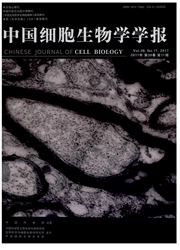

 中文摘要:
中文摘要:
该文采用旋转培养方式研究微重力培养条件对造血干祖细胞向中性粒细胞分化的效率和功能的影响。脐血CD34+细胞用扩增体系[Stem Span SFEM培养基、干细胞因子(stem cell factor,SCF)、Fms相关酪氨酸激酶3受体(Fms-related tyrosine kinase 3 ligand,Flt3)、血小板生成素(thrombopoietin,TPO)、白细胞介素-3(interleukin-3,IL-3)]静置培养7 d后,再分成静置培养(static culture,SC)组和旋转培养(rotate cell culture system,RCCS)组,并换为分化培养体系[Stem Span SFEM培养基、IL-6、粒细胞集落刺激因子(granulocyte colony stimulating factor,G-CSF)、SCF、Flt3、IL-3]再培养9 d。培养过程中用流式细胞术检测CD34、CD38、CD11b、CD16b、CD66b比例,第16 d收集细胞进行中性粒细胞功能检测。结果表明,RCCS组和SC组均能形成形态正常和功能成熟的中性粒细胞,RCCS组CD16b~+的中性粒细胞比例显著增多(29.82%±2.48%vs 15.01%±0.62%,P〈0.01),且细胞产生活性氧簇(reactive oxygen species,ROS)的能力显著增强(P〈0.05),具有趋化运动能力的细胞增多(50.430%±3.275%vs 34.000%±0.700%,P〈0.05)、运动速度增快(8.100±0.404μm/min vs 5.850±0.050μm/min,P〈0.05)。该文结果提示,微重力培养条件能促进造血干祖细胞分化为形态正常和功能成熟的中性粒细胞。
 英文摘要:
英文摘要:
This paper aims to determinate the impact of the RCCS(rotate cell culture system) on granulopoiesis of hematopoietic stem/progenitor cells and evaluate the efficiency of functionally mature neutrophil generation. CD34+ cells enriched from umbilical cord blood were cultured in Stem Span SFEM containing SCF(stem cell factor), Flt3(Fms-related tyrosine kinase 3 ligand), IL-3(interleukin-3) and TPO(thrombopoietin). After 7 days, cells were cultured in medium containing SCF, Flt3, IL-3, IL-6 and G-CSF(granulocyte colony stimulating factor). After 7 days of expansion, those cells were divided into 2 groups, SC(static culture) group and RCCS group, and separately cultured for next 9 days inducing granulocyte differentiation. To evaluate the differentiate efficiency, the expression of surface markers, such as CD34, CD38, CD11 b, CD16 b and CD66 b were detected by flow cytometry. On day 16, cells were harvested and numerical expansion, cell morphology, chemotaxis, phagocytosis and ROS production were used for evaluating the quality and quantity of neutrophils from the two groups. Both groups could successfully induce functionally mature neutrophils, while the percentage of CD16b~+ cells in RCCS group was higher than that in SC group(29.82%±2.48% vs 15.01±0.62%, P〈0.01). Compared to the SC group, RCCS could increase the efficiency of neutrophil ROS production and chemotaxis(P〈0.05). Altogether, these results indicated that the RCCS significantly promoted the efficiency of generation of functionally mature neutrophil from hematopoietic stem and progenitor cells.
 同期刊论文项目
同期刊论文项目
 同项目期刊论文
同项目期刊论文
 期刊信息
期刊信息
